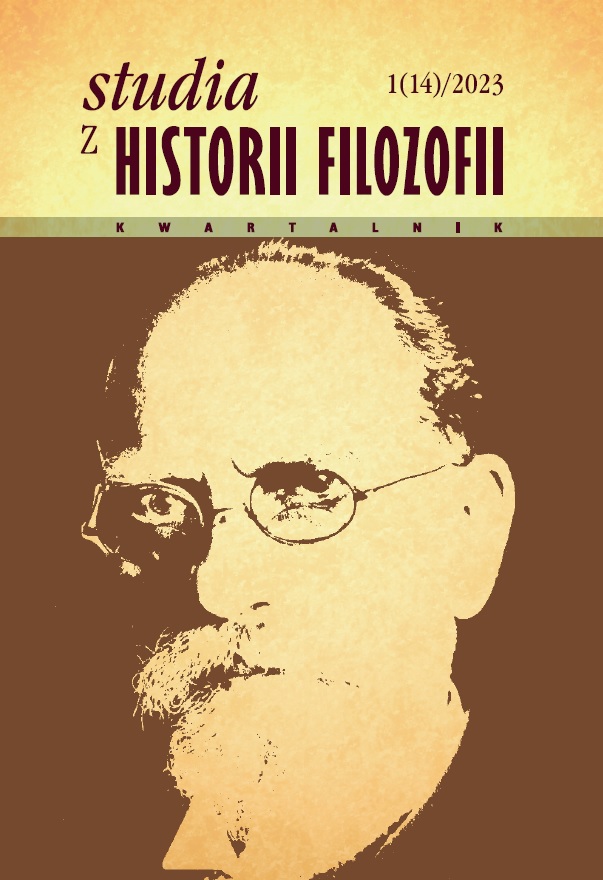Husserlowska wariacja imaginacyjna i problem jej wykonalności w kontekście rozważań Romana Ingardena
DOI:
https://doi.org/10.12775/szhf.2023.001Słowa kluczowe
wariacja imaginacyjna, operacja uzmienniania, transcendencja, konstytuująca świadomośćAbstrakt
Niniejszy artykuł prezentuje zagadnienie operacji wariacji imaginacyjnej w perspektywie problemu jej wykonalności oraz samej zasadności jej przeprowadzenia. Koncepcję wariacji imaginacyjnej nierozerwalnie wiążę z kategoriami transcendencji oraz konstytuującej świadomości. W pierwszej części pracy dokonuję wstępnej charakterystyki operacji uzmienniania. W drugiej części prezentuję zarzuty Romana Ingardena, jakie wystosował w swoich Uwagach krytycznych, w stronę możliwości i zasadności jej wykonalności.
Bibliografia
Bielawka Maria. 2012. „Husserlowska redukcja transcendentalna wobec redukcji ejdetycznej”. Lectiones & Acroases Philosophicae 5(2): Metafizyka. Fenomenologia. Realizm, red. Damian Leszczyński, Piotr Żuchowski, Stowarzyszenie Polskie Forum Filozoficzne, 21–32. Wrocław: Polskie Forum Filozoficzne.
Husserl Edmund. 1967. Idee czystej fenomenologii i fenomenologicznej filozofii, przeł. Danuta Gierulanka, księga 1. Warszawa: PWN.
Husserl Edmund. 1982. Medytacje kartezjańskie, przeł. Andrzej Wajs. Warszawa: PWN.
Husserl Edmund. 2000. Badania logiczne. Badania dotyczące fenomenologii i teorii poznania, przeł. Janusz Sidorek, t. 2, cz. 1. Warszawa: Wydawnictwo Naukowe PWN.
Husserl Edmund. 2004. Husserliana. Gesammelte Werke, t. 38: Wahrnehmung und Aufmerksamkeit. Texte auf dem Nachlass (1893–1912). Freiburg im Breisgau: Thomas Vongher und Regula Giuliani.
Husserl Edmund. 2013. Doświadczenie i sąd, przeł. Bogdan Baran. Warszawa: Aletheia.
Ingarden Roman. 1974. Wstęp do fenomenologii Husserla, przeł. Andrzej Półtawski. Warszawa: PWN.
Ingarden Roman. 1982. „Uwagi krytyczne Romana Ingardena do Medytacji kartezjańskich”. W: Edmund Husserl, Medytacje kartezjańskie, 237–291. Warszawa: PWN.
Ingarden Roman. 1987. Spór o istnienie świata, t. 2: Ontologia formalna, cz. 1: Forma i istota. Warszawa: PWN.
Kucharczyk Janusz. 2001. „Syntetyczny charakter filozofii Francisca Suareza”. Folia Philosophica 19: 123–139.
Paź Bogusław. Dostęp 13.03.2018. http://www.ptta.pl/pef/pdf/i/Istota.pdf.
Półtawski Andrzej. 1973. Świat, spostrzeżenie, świadomość. Fenomenologiczna koncepcja świadomości a realizm. Warszawa: PWN.
Półtawski Andrzej. 1994. „Wartości a ontologia Ingardena”. Sztuka i Filozofia 8: 5–18.
Prechtl Peter. 1998. Edmund Husserl zur Einführung. Hamburg: Junius.
Ricoeur Paul. 1985. Egzystencja i hermeneutyka. Rozprawy o metodzie. Warszawa: Instytut Wydawniczy PAX.
Sobota Daniel. 2012. Źródła i inspiracje Heideggerowskiego pytania o bycie. Neokantyzm i fenomenologia, t. 1. Bydgoszcz: Fundacja Kultury Yakiza.
Stróżewski Władysław. 2013. Logos, wartość, miłość. Kraków: Wydawnictwo Znak.
Vaihinger Hans. 1918. Die Philosophie des Als Ob. Leipzig: Verlag von Felix Meiner.
Wolff Christian. 1736. Philosophia prima sive Ontologia. Frankfurt–Leipzig: Prostat in Officina Libraria Rengeriana.
Pobrania
Opublikowane
Jak cytować
Numer
Dział
Licencja

Utwór dostępny jest na licencji Creative Commons Uznanie autorstwa – Bez utworów zależnych 4.0 Międzynarodowe.
Statystyki
Liczba wyświetleń i pobrań: 501
Liczba cytowań: 0



